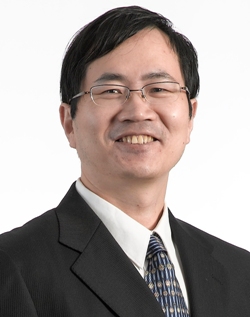Seminar Information
Time: Oct. 21(Tuesday) 12:00 -- 13:10
Location: 301
Title:
Artificial Intelligence without Restriction Surpassing Human Intelligence with Probability One - Theoretical Foundation on Singularity Turning Point and Social Impact in Intelligent Economy with AI Twins of the Brain
Speaker:
Guang-Bin Huang, Chair Professor, Southeast University, China, Founder of Mind PointEye, Singapore
Abstract:
Driven by Watt's steam engine, the Industrial Revolution transformed production methods from manual labors to machine operations, resulting in a significant increase in productivity. Similarly, Artificial Intelligence (AI) heralds the arrival of what may be the greatest new era in human history: the Intelligence Revolution. This revolution is accelerating the transition from a digital economy to an Intelligent Economy, which could potentially surpass the scale of the traditional economy by several times.
It is difficult to understand meanings of Intelligence. Intelligence is composed of an infinite number of systems and functions. From the traditional perspectives of mathematics and biology, analyzing whether artificial intelligence can surpass human intelligence seems to be an unsolvable question. However, the AI twin of the brain offers a third way to analyze and understand the intelligent functions of the brain.
This talk will brief a latest theoretical proof and AI twins insight on unconstrained artificial intelligence surpassing human intelligence with probability one, which further shows the singularity turning point and demonstrates that artificial intelligence can develop the theoretical foundations for reasoning, innovation, and the discovery of natural principles and rules.
This talk will further focus on the AI’s social potential in intelligent economy, especially in two aspects: 1) As AI systems become more integrated with robotics, we are witnessing the emergence of autonomous agents that not only think but act—machines that can perceive, decide, and interact with the physical world. As AI empowers machines with cognitive and physical abilities, robots become the tangible embodiment of artificial intelligence. 2) As AI reshapes every domain of society, AI education may evolve in parallel. Preparing the next generation of scientists, engineers, and informed citizens requires a rethinking of educational systems at all levels. Cultivating interdisciplinary talent in AI, neuroscience, robotics, and ethics will be essential to ensure the responsible and creative development of future technologies. This talk will share some observations and thoughts on the trend of embodied robots and AI education in China and Singapore.
Speaker Biography
Guang-Bin Huang is Chair Professor, Southeast University, China and Founder of Mind PointEye, Singapore. He was a Full Professor in the School of Electrical and Electronic Engineering, Nanyang Technological University, Singapore. He was a Nominee of Singapore President Science Award (2016, 2017, 2018 and 2019), was awarded by Thomson Reuters “Highly Cited Researcher” (in two fields: Engineering and Computer Science) and listed in Thomson Reuters’s “The World's Most Influential Scientific Minds” since 2014. He received the best paper award from IEEE Transactions on Neural Networks and Learning Systems (2013). His two works on Extreme Learning Machines (ELM) have been listed by Google Scholar in 2017 as Top 2 and Top 7, respectively in its “Classic Papers: Articles That Have Stood The Test of Time” - Top 10 in Artificial Intelligence.
He was Principal Investigator of BMW-NTU Joint Future Mobility Lab on Human Machine Interface and Assisted Driving, Principal Investigator (data and video analytics) of Delta – NTU Joint Lab, Principal Investigator (Scene Understanding) of ST Engineering – NTU Corporate Lab, and Principal Investigator (Marine Data Analysis and Prediction for Autonomous Vessels) of Rolls Royce – NTU Corporate Lab. He has led/implemented several key industrial projects (e.g., Chief architect/designer and technical leader of Singapore Changi Airport Cargo Terminal 5 Inventory Control System (T5 ICS) Upgrading Project, etc).


